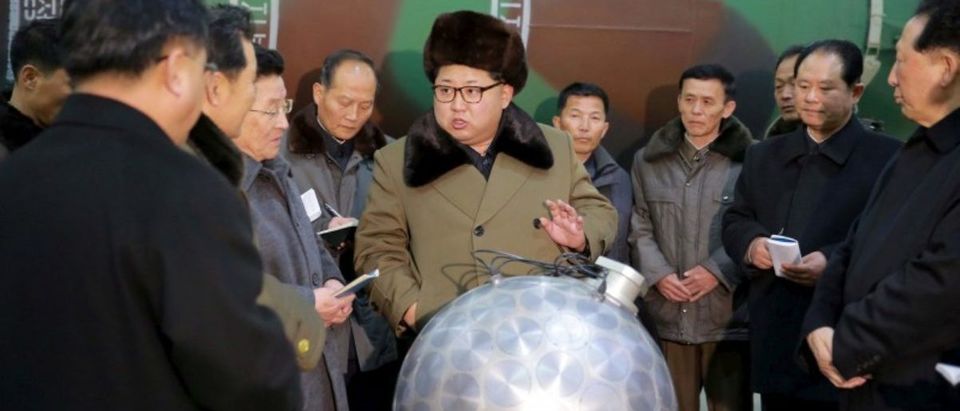The United Nations is preparing to vote on new sanctions, but will they slow North Korea’s tireless march toward bigger bombs and more powerful missiles?
North Korea’s pursuit of nuclear weapons and ballistic missiles has been an uphill battle for years, as the international community has been sanctioning North Korea for more than a decade. North Korea tested a lackluster nuclear device for the first time in 2006, but about a week ago, the rogue regime tested a possible staged thermonuclear bomb for deployment atop the North’s Hwasong-14 intercontinental ballistic missile (ICBM).
In the wake of North Korea’s second ICBM test in late July, the U.N. approved the “strongest sanctions ever” on the country. Since sanctions went into effect, North Korean markets have remained stable. It is, however, difficult to know what effect sanctions will have in the long run.
“As the sanctions regime expands, so does the scope of evasion,” a U.N. panel of experts concluded recently, “Lax enforcement of the sanctions regime coupled with the [Democratic People’s Republic of Korea’s] evolving evasion techniques [is] undermining the goals of the resolutions that the DPRK abandon all [weapons of mass destruction].”
Andrea Berger, an associate fellow at the Royal United Services Institute, called the North Korean sanctions regime a “house without foundations,” claiming that “not a single component of the U.N. sanctions regime against North Korea currently enjoys robust international implementation.”
As to whether economic sanctions can effectively prevent North Korea from advancing its nuclear weapons and ballistic missile programs, answers vary greatly.
“They’d rather eat grass than give up their nuclear program,” Russian President Vladimir Putin said recently.
North Korea has experienced famine and mass starvation before, and North Korean officials appear indifferent to sanctions, even if the state media outlets issue threats in response to possible sanctions.
“We’ve been through [devastation] twice before — the Korean War and the Arduous March,” a North Korean official told Evan Osnos, a staff writer for The New Yorker, referencing a bloody conflict and a famine that killed nearly a million North Korean people. “We can do it a third time.”
“A lot of people would die. But not everyone would die,” he said, talking about a nuclear war with the U.S. If the North is as calm in the face of nuclear war as this one official suggests, why should the country be concerned about sanctions?
Others argue that the U.S., as one of the main proponents of the pressure campaign, should be strengthening sanctions against both North Korea and foreign companies and individuals that support the regime.
“The best options are ensuring we have sufficient deterrence and defenses against North Korea’s military threats, but also increasing pressure on North Korea,” Bruce Klingner, the former chief of the Central Intelligence Agency’s Korea branch and now a senior research fellow for Northeast Asia at the Heritage Foundation’s Asian Studies Center, previously told The Daily Caller News Foundation.
“There is a widespread misperception that North Korea is maxed out on sanctions and that there is nothing more we can do,” he argued. “The U.S. has a number of North Korean and Chinese entities that we could be sanctioning, but we have been pulling our punches.”
A Center for Advanced Defense report released in June asserts that North Korea’s vast overseas financial and procurement networks are “ripe for disruption,” concluding these networks are “centralized, limited, and vulnerable.”
“Economic sanctions will erode the North Korean regime’s grip on power, create more opportunities for market activities, and stir all kinds of corruption and disorder in the country,” Ri Jong Ho, who worked for a covert unit designed to secure funds for the North Korean regime before defecting three years ago, told Voice of America.
Ri also introduced many of the way North Korea evades sanctions, weakening their effects.
The challenge now is that the international community is no longer trying to stop North Korea from developing nuclear weapons and ballistic missiles. The U.S. and its partners are working to take nuclear weapons away from the North Koreans, a much more difficult task. North Korea has said many times that it will never negotiate away its nukes.
Send tips to ryan@
All content created by the Daily Caller News Foundation, an independent and nonpartisan newswire service, is available without charge to any legitimate news publisher that can provide a large audience. All republished articles must include our logo, our reporter’s byline and their DCNF affiliation. For any questions about our guidelines or partnering with us, please contact licensing@dailycallernewsfoundation.org.


